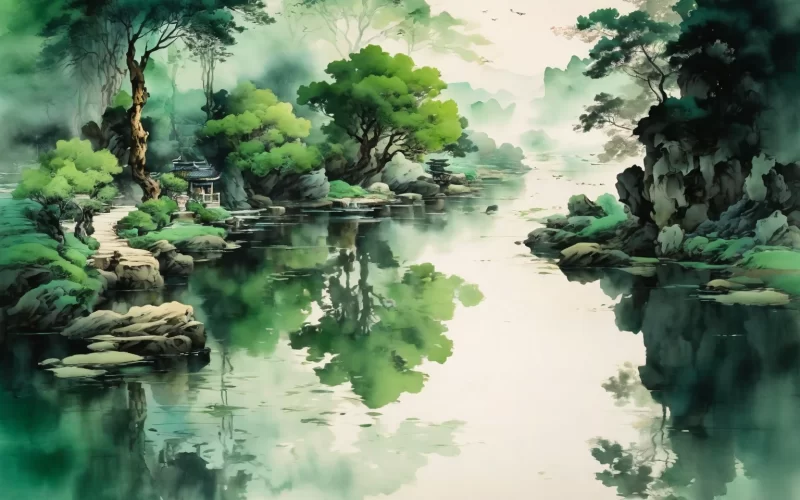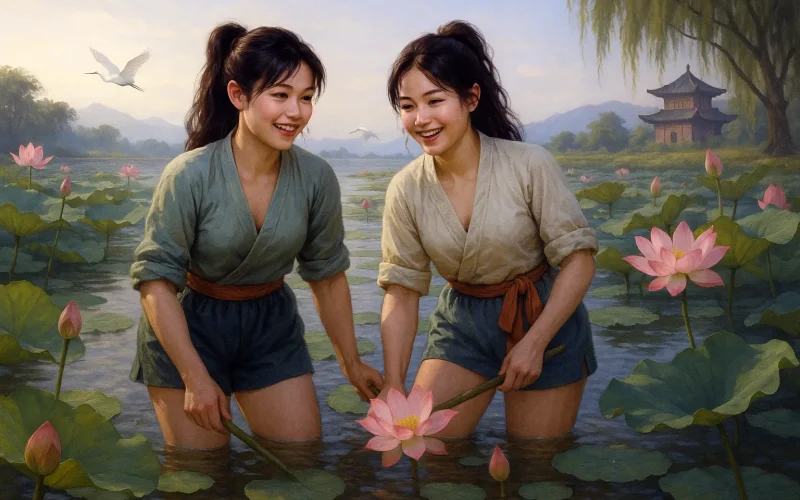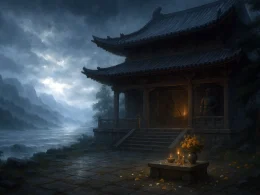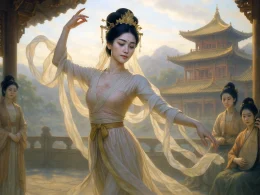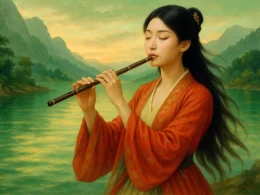The Clear Stream clears my own heart;
The color of its water is different from all other streams.
I would like to ask the Xin’an River:
Can its clarity reach the bottom like this?
People walk as if within a bright mirror;
Birds pass as if across a painted screen.
Toward evening, the gibbons cry,
Vainly saddening the heart of this far-roaming traveler.
Original Poem
「清溪行」
李白
清溪清我心,水色异诸水。
借问新安江,见底何如此。
人行明镜中,鸟度屏风里。
向晚猩猩啼,空悲远游子。
Interpretation
Composed in 754 CE during Li Bai's later years while wandering near Xuancheng, this work reflects the poet's profound worldly experience, particularly the decade of wandering following his dismissal from court. Having gained painful insight into political corruption and life's hardships, Li Bai found deep resonance in the pristine waters of Clear Stream—its purity echoing his desire to transcend worldly impurities and seek spiritual peace. More than a tribute to nature, this poem is a soulful meditation on life's ideals and flavors.
First Couplet: "清溪清我心,水色异诸水。"
Qīng xī qīng wǒ xīn, shuǐ sè yì zhū shuǐ.
Clear Stream clears my heart; Its hue differs from all other waters.
The opening couplet establishes the theme with lyrical repetition, emphasizing the stream's dual purification of both environment and soul. "Clears my heart" is the poetic core, directly linking physical clarity to mental serenity and setting a tone of nature-self fusion. "Differs from all other waters" endows Clear Stream with transcendent qualities, reflecting both realistic observation and the poet's pursuit of an idealized realm beyond the ordinary.
Second Couplet: "借问新安江,见底何如此。"
Jièwèn Xīn'ān Jiāng, jiàndǐ hé rú cǐ.
I ask the Xin'an River: "Though transparent to your bed, How can you compare to this?"
Using personified inquiry, the poet introduces the famously clear Xin'an River as a benchmark. The latter's clarity represents a physical extreme—literal transparency—while Clear Stream's purity transcends into aesthetic and philosophical dimensions. This seemingly illogical comparison exemplifies Li Bai's strategic hyperbole, elevating Clear Stream beyond conventional standards into a spiritual solace characterized by ethereal resonance.
Third Couplet: "人行明镜中,鸟度屏风里。"
Rén xíng míngjìng zhōng, niǎo dù píngfēng lǐ.
People walk as in a bright mirror; Birds pass as through a painted screen.
This iconic couplet elevates the poem to its zenith. The "bright mirror" metaphor captures the water's static clarity and reflective purity, while the "painted screen" evokes the picturesque beauty of flanking mountains. "People walking" and "birds passing" inject dynamic life into the serene tableau. The lines create an illusory, immersive world where the poet temporarily escapes worldly cares, achieving unity with nature.
Fourth Couplet: "向晚猩猩啼,空悲远游子。"
Xiàng wǎn xīngxīng tí, kōng bēi yuǎn yóu zǐ.
At dusk, gibbons cry; In vain, they grieve this wanderer far from home.
The conclusion marks a poignant turn, deepening the emotional texture. As dusk falls, haunting gibbon calls shatter the tranquility, pulling the poet from the ideal "mirror" world back to reality. "In vain, they grieve" conveys complex sorrow: nostalgia for the pure landscape he cannot remain in, lament for his rootless existence, and despair over life's elusive ideals. This sorrow feels weightier against the preceding purity, tingeing the ethereal beauty with mortal melancholy.
Holistic Appreciation
This lyrical landscape poem centers on "clarity" as its soul, structured around the poet's journey. The first six lines exhaustively praise Clear Stream's purity, constructing a transcendent utopia for spiritual immersion. The final couplet shifts abruptly, using gibbon cries to evoke sorrow, revealing the chasm between ideal and reality—an emotional awakening. This "immersion-emergence" dynamic creates intense tension, expressing the poet's struggle between seeking transcendence and being bound by worldly cares. The clearer and more perfect the stream, the more it highlights his inescapable loneliness and grief.
Artistic Merits
- Clarity as Structural Backbone: The motif of "clarity" governs the poem, unifying scenery, emotion, and philosophy into an organic whole.
- Masterful Contrast and Juxtaposition: Using "all waters" as general foil and "Xin'an River" as strong benchmark, the poet elevates Clear Stream's purity to an aesthetic peak.
- Creation of Real-Illusory Conception: Metaphors like "bright mirror" and "painted screen" blend reality and illusion, transforming physical landscape into an ethereal artistic vision characteristic of Li Bai's romanticism.
- Pivoting from Joy to Sorrow: The stark contrast between the first six lines' radiant serenity and the conclusion's desolate grief achieves a "doubled sorrow-and-joy" effect, leaving lasting resonance.
Insights
This poem explores a profound life question: how to safeguard an inner "Clear Stream" in a turbid world. Li Bai teaches that true purity isn't ignorance of suffering but the ability to discover, appreciate, and cling to beauty and nobility despite life's sorrows. Clear Stream is the spiritual sanctuary he carved for himself and all souls struggling in reality. It inspires us that in a complex world, while we may not change external "turbidity," we can cultivate and guard our own "Clear Stream"—allowing it to constantly "clear our hearts" and become a wellspring of strength against nihilism and a haven for the soul. This very yearning for purity and beauty constitutes a noble form of spiritual resistance.
About the poet

Li Bai (李白), 701 - 762 A.D., whose ancestral home was in Gansu, was preceded by Li Guang, a general of the Han Dynasty. Tang poetry is one of the brightest constellations in the history of Chinese literature, and one of the brightest stars is Li Bai.






